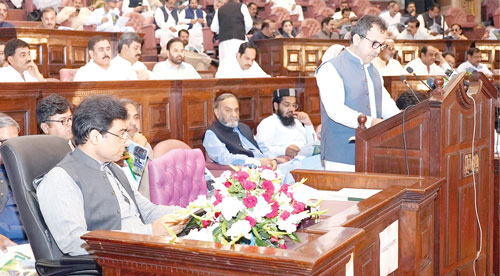Proposes increase of 15% in salaries, 5% in pensions; Rs470bn allocated for health, Rs485.26bn education; Blames PTI govt for wasting 3 years in framing false cases against opposition; No new taxes proposed
PML-N MPA Sardar Awais Leghari on Wednesday presented Punjab’s budget for the fiscal year 2022-23 at the budget session chaired by Deputy Speaker Dost Mohammad Mazari and held in Aiwan-i-Iqbal in Lahore, while another session chaired by Speaker Chaudhry Parvez Elahi took place simultaneously at the provincial legislature.
The parallel sessions were held after the government and the opposition failed to resolve their differences. It was likely the first time that separate sessions of the Punjab Assembly were held in tandem.
After a two-day-long delay, Punjab Finance Minister Sardar Awais Laghari unveiled a Rs3.226 trillion provincial budget for the fiscal year 2022-23, terming it a “pro-poor and pro-development budget”.
The Opposition and the government convened two separate sessions at the Punjab Assembly and the Aiwan-e-Iqbal, respectively. The former’s session started Wednesday but has been adjourned till 1pm today, while the Aiwan-e-Iqbal session started after 4pm.
The Opposition’s session took place at the Punjab Assembly with speaker Chaudhry Pervaiz Elahi in the chair. During the session, the Opposition lawmakers criticised the government and PML-N leader Attaullah Tarar who had been asked to leave the Punjab Assembly two days back during the first session of the budget. The Opposition was irked and demanded that the inspector-general and chief secretary be present during the session. As a result, the two sides could not develop a consensus over the issues.
Presenting the budget proposals, Laghari criticised the previous PTI-led government, saying its policies stalled development in the province for the last three years.
“Data shows that during the period 2019-22, there has neither been a single development programme worth mentioning nor has the province witnessed any social welfare programme,” he said, blaming the PTI government for “wasting three years in framing false cases” against the opposition.
Recalling the last budget of the PML-N government for the fiscal year 2017-18, the finance minister highlighted that at the time, the country’s GDP growth was rising at a steady pace and that the per capita income had reached $1,629.
He added that foreign investment was pouring in as Pakistan was declared an investment-safe country, the stock market was the second-best in Asia and international institutions were recognising Pakistan’s growth.
The provincial minister accused the PTI-led government of not paying attention to the energy issues which led to other problems, including unemployment, poverty, and inflation, among others.
Divulging into the details of the budget, the finance minister said out of the total amount of the budget, it has been proposed to keep Rs1,712 billion for running expenditures.
The income has been estimated at Rs2.521 trillion the finance minister said, adding that the province is expected to receive over Rs2.020 trillion from the federal divisible pool.
The government allocated a hefty amount of Rs685bn under the Annual Development Programme with a special focus on pro-poor initiatives and controlling inflation. No new tax has been imposed in the budget. In terms of development sectors, the highest allocation of Rs272.6bn was for the social sector, which includes Rs172.5 5bn for the health sector and Rs64.56bn for the education sector. Additionally, Rs164bn were allocated to infrastructure development, including Rs80.8bn for the roads sector. The finance minister said over Rs500 billion are expected to be collected under the head of provincial receipts — more than 24% in comparison with last year’s collection.
Laghari said the government, aiming for a 24% increase, has set the target of non-tax revenue at Rs163 billion. He went on to add that under the chief minister’s relief package, Rs200 billion will be allocated for providing wheat at a cheaper rate to the masses. Laghari said that a 10kg wheat bag, which was earlier available at Rs650 could be bought at Rs490 now.










